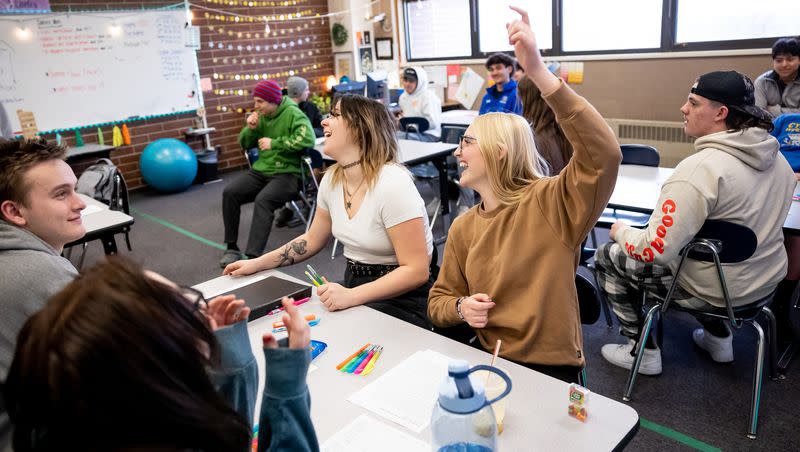Poll: Half of Utahns oppose using income tax revenue beyond education, services for children, disabled

Half of Utahns oppose spending income tax revenue on programs or services beyond education and services for children and people with disabilities, a new Deseret News/Hinckley Institute of Politics poll shows.
Twenty-nine percent of the 801 registered voters polled by Dan Jones & Associates said they strongly oppose a proposed constitutional amendment regarding the use of income tax, which would prioritize using income tax for education but allow the funds to be spent for other purposes. Meanwhile, 21% said they somewhat oppose the amendment.
Meanwhile, a total of 36% said they either strongly support or somewhat support the proposed constitutional amendment, but among them, just 12% indicated strong support.
The poll, conducted March 14-22, has a margin of error of 3.46 percentage points.

Utah legislative leaders say the structural imbalance in state tax revenue streams ties their hands in budgeting decisions. Expanding the earmark, as proposed under SJR10, would give lawmakers more flexibility to meet the state’s needs.
Lawmakers also passed HB54 during the Utah Legislature’s General Session earlier this year. Under that legislation, lawmakers would remove the state portion of sales tax on food if a majority of Utah voters pass the constitutional amendment on income tax uses in 2024.
The poll question does not address the proposal to remove food tax but seeks to gauge Utahns’ sentiments about a historical constitutional guarantee that income tax revenue is primarily reserved for education.
Nor does the poll question address record spending for education appropriated during the Utah Legislature’s 2023 session.
But the results set a baseline, said Sen. Dan McCay, R-Riverton, sponsor of SJR10.
“The great thing about the poll being done right now, is there hasn’t been a lot of conversation yet about it publicly. There hasn’t been a lot of education as to ‘why’” the GOP-majority Utah Legislature is seeking a constitutional amendment, he said.
The soonest the proposed constitutional amendment could be considered by Utah voters would be the November 2024 general election.
Meanwhile, it is incumbent on lawmakers “to lay out a good case for why it needs to be done,” McCay said.
“I think a lot of those decisions are made at the ballot, and I think it will be interesting to see as people learn the pros and cons of why it needs to be done and why the Legislature feels like we need this flexibility, it will give people the opportunity to put themselves in the Legislature’s shoes as we try to balance the budget,” he said.
According to the poll results, Utahns age 57 and older were most opposed to the proposed constitutional amendment, with 36% indicating they were strongly opposed and 20% saying they were somewhat opposed.
Related
Among slightly younger respondents, ages 41-56, 36% said they were strongly opposed with 20% indicating they were somewhat opposed.
Utah Education Association President Renée Pinkney said the poll results reflect the importance Utahns place on the earmark.
“The poll results highlight the value Utahns place on the constitutional mandate that prioritized education funding and how critical it is to understand the ramifications of the proposed change. This is why we will take the issue to our members in a few weeks,” said Pinkney in a statement, referring to the upcoming meeting of the association’s House of Delegates.
According to the poll results, 18% of Utahns ages 18-24 said they strongly supported the proposal while 26% said they somewhat supported it.
McCay said it is unclear why younger and older respondents had divergent perspectives on the proposed constitutional amendment, but the issue deserves careful study by all Utahns, he said.
“You know, it should be hard to amend the constitution. This is an important policy that we’ve had for a long time in the state, and I think it should be one that everybody really spends time thinking through and making sure we get this right,” he said.
Income tax has been reserved for funding public education since the mid-1940s, although the constitution has been twice amended in the succeeding years to also allow using income tax revenue to support public colleges and universities and, more recently, for programs for children and people with disabilities.
Opponents question whether statutory assurances regarding education funding would be as secure as a constitutional guarantee. But veteran lawmaker Sen. Curt Bramble, R-Provo, has said, the public and public opinion polls consistently identify education as the state’s top priority, thus it is a funding priority for lawmakers.
Related

